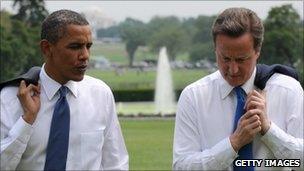US and UK's 'essential relationship': More than words?
- Published
- comments

David Cameron's first official visit to the US as prime minister was in July 2010
Picture the scene. It's late at night. Two lovers meet. They have been through much together. She used to be the one around whom the world span but now she has mainly memories. He is now the one who turns heads and who everyone wants to be friends with.
She turns to him and asks pleadingly "Darling, do you still think I'm special?"
"Of course I do," he replies automatically, without warmth for the 100th time.
Then, smiling, he adds "Above all, my love, you are essential".
Few relationships have to withstand more scrutiny than that between Britain - the ageing dame on the world stage - and America - still its young, virile star.
What's more, this ancient relationship between two countries and two peoples is seen by many through the prism of the relationship between its two leaders.
That is why David Cameron and Barack Obama's choice of words, external to describe their relationship matters. By labelling it "essential" rather than "special" (they, incidentally, will insist that it can be and is both) they are signalling something important.
Both sides know that the British media - rather more than our leaders - will leap on any sign that their country no longer matters as much as it once did.
Both sides know that the Obama White House in its early days was totally insensitive to this. The removal of Churchill's bust from the Oval Office, the gift to Prime Minister Brown of a boxed set of DVDs available on any high street and what became known as "Gordon's kitchen nightmare" - the "brush past" meeting in the kitchen of the UN's HQ in New York - were all signs of that.
Lacking affection
Both sides know, however, that it simply would not be credible for Obama to suddenly declare his passion for Britain.
While one of his grandfathers relayed happy memories of the Brits after his time as a GI based in the New Forest, the other shared stories of having been imprisoned and abused by British forces in Kenya (as Ben McIntyre of The Times relates powerfully today, external).
Thus, David Cameron has persuaded his guest to adopt a phrase he first used in the White House last July. "The essential relationship" may lack emotion, warmth and nostalgia but it, like the president, is meant to be contemporary, practical and sincere.
It is supposed to reflect our two countries' mutual dependence and the value to the wider world of British and American co-operation in Afghanistan, in the battle against al-Qaeda, in Libya and in encouraging the rise of democracy in the Arab world.
It is a reflection, too, of David Cameron's understanding that he has to show that Britain has something to offer her partner rather than being seen as needing constant reassurance that she still matters.
Closeness to an American president is a huge prize for any prime minister - not least when the man from the White House is as popular here as Barack Obama is.
That closeness does not depend on party politics. After all, JFK - a Democrat - became so close to Harold Macmillan - an old school Tory - that he referred to him affectionately as "Uncle Harold".
In their joint article the prime minister and the president speak of "coming of age" at the same time, of seeing "eye to eye", of a relationship between their two countries which is "a perfect alignment of what we both need and what we both believe".
It even, though not by name, compares their shared willingness to stand up for freedom with the bond between Margaret Thatcher and Ronald Reagan during the Cold War.
The test of this visit and the months to come is whether these words turn out to be more than just the work of skilful writers, diplomats and spin doctors inside Number 10 and the White House.
PS. You can hear my short radio profile of Macmillan here along with today's programme about Harold Wilson and all the previous episodes.